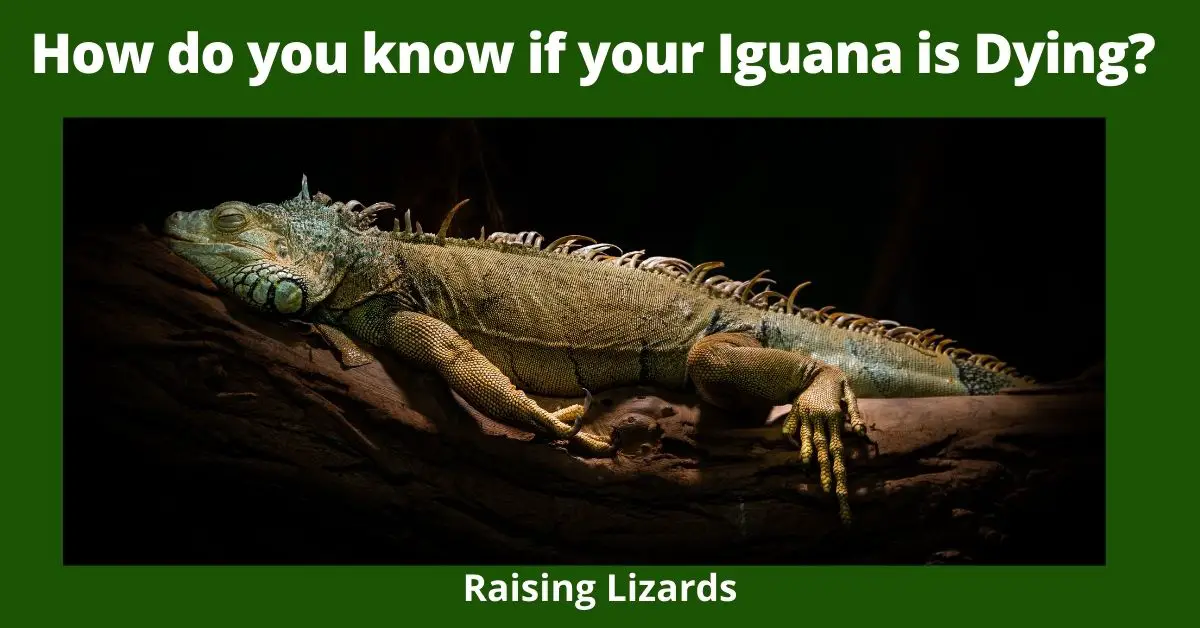How to Save a Dying Iguana?
My Iguana looks like it’s going to KICK the Bucket
My Pet Iguana is acting sick, not eating, moving turning colors.
Diagnose Simple Common Illnesses
What Are Signs My Iguana is Dying?
- There are a number of signs that you can look for to determine if your iguana is sick or dying. Some of these include: lethargy, difficulty eating and moving around, decreased appetite and weight loss, cloudy eyes, and excessive mucous production. If you think your iguana might be ill or dying then it is important that you seek veterinary assistance as soon as possible! How to Save a Dying Iguana?
- Lethargy
- Loss of Appetite
- Bowels – runny or Constipated
- Egg Bound
- Cloudy Eyes
- Sunken Eyes
- Fluids oozing from Iguanas openings – nose, eyes, ears, bottom
What are Signs that Iguana is Dying of Old Age?
Some of the signs that a senior Iguana is Dying are:
- Lack of appetite
- Inactivity
- Reduced mobility
- arthritus
- too weak to eat
- Advanced in Age
- Skin Loss
Some of the Illness will have similar causes and origins – so there will be some duplication
How do you know if your Iguana is Dying?
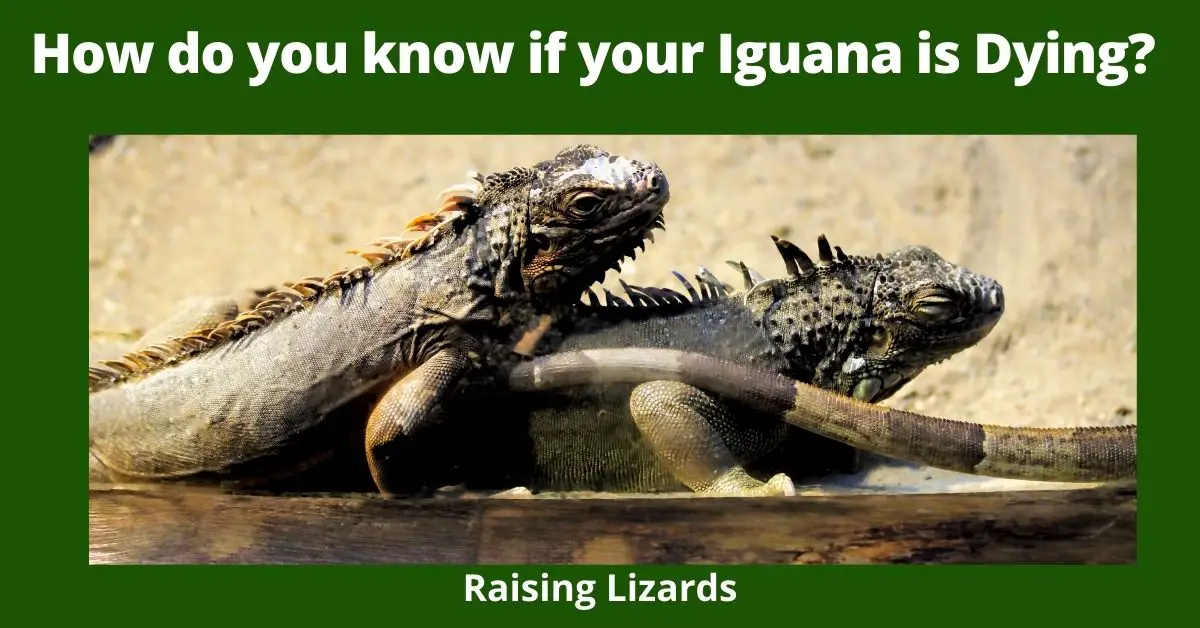
What Causes Iguanas to Have Appetite Loss?
- Iguanas can lose their appetite for a variety of reasons, including changes in their environment, stress, or illness. If your iguana is not eating, there are several things you can do to encourage him to eat again.
- Make sure your iguana’s habitat is set up properly and that he has plenty of fresh water and food
What Causes Iguanas to have a Lack of Energy?
There are many potential reasons why an iguana may have a lack of energy. One common reason is that the iguana is not getting enough food. Iguanas need to eat a variety of fresh fruits and vegetables in order to stay healthy. If they do not get enough nutrients from their diet, they will become lethargic.
Another potential reason for a lack of energy is dehydration. Iguanas need to drink plenty of water in order to stay hydrated. If they don’t get enough fluids, they will become lethargic and may even start to lose their appetite.
Iguana owners should also be aware of the possibility that their iguana may be sick. If an iguana is not acting like itself, it may be a sign that something is wrong. Iguanas that are sick often have a lack of energy and may not want to eat or drink.
If you notice that your iguana has a lack of energy, there are several things you can do to help him feel better. Make sure that your iguana is eating a healthy diet and drink plenty of water.
Make sure your iguana’s habitat is set up properly
What Causes Iguanas to Twitch?
Some nervous problems iguanas have can be cured with medicine, but other problems, like twitching, might not have a clear cause and can’t always be fixed.
Some people think that iguanas twitch because they’re cold or hungry, but those aren’t the only reasons.
There are lots of different things that could make an iguana twitch, from parasites to anxiety.
What Causes Iguanas to have Loss of Balance?
If Your Iguana Falls from his branch watch for these symptoms:
Loss of Balance
Tail Curling
Incoordination
These could be caused by many things including:
- Injury
- Illness
- Parasites
- Dehydration
If your Iguana starts exhibiting any of these symptoms, Early intervention can mean the difference between a full recovery and permanent injury. Keep an eye on Your Iguana and hopefully, he will stay
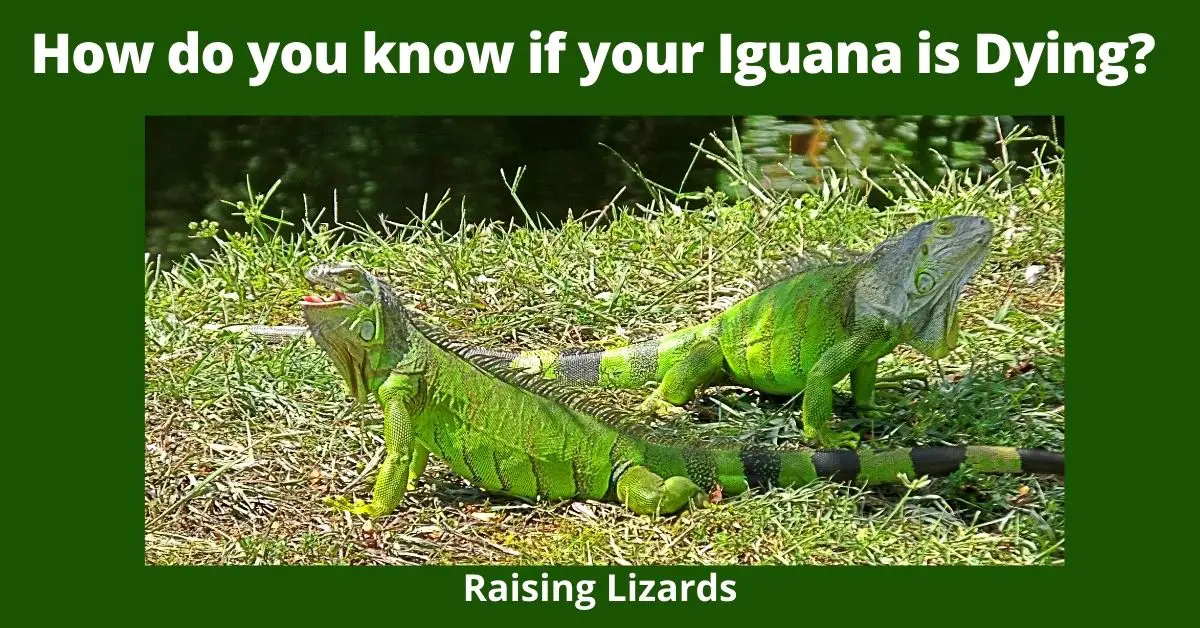
What Causes Iguanas to Runny Nose?
If there is fluid dripping from your iguana’s nose, the cause may be due to a respiratory infection, or it could be caused by something else. The most common respiratory infection in iguanas is pneumonia, which is a serious illness that can lead to death if not treated. Other causes of a runny nose in iguanas include colds, sinus infections, and allergies.
If you think your iguana may have a respiratory infection, take it to the veterinarian immediately for treatment. Treatment will vary depending on the cause of the infection but may include antibiotics, antiviral medications, or other treatments. Left untreated, a respiratory infection can be fatal to an iguana.
What Causes Iguanas to Vomit?
If your Iguana is puking after eating check the following:
- Food too big or indigestible: Some iguanas will vomit if they eat something that is too large or difficult to digest. Try breaking up the food into smaller pieces.
- Bacteria overgrowth in gut: If your iguana has a bacterial overgrowth in their gut, it can cause them to throw up. This can be treated with antibiotics prescribed by your veterinarian.
- Dehydration: If your iguana is dehydrated, it can cause them to vomit. Make sure they are getting enough water and if necessary, see a vet for help restoring hydration levels.
- Stress: Iguanas can vomit when they are stressed out. If your iguana is displaying any other signs of stress, such as hiding or refusing to eat, see a vet.
- Foreign body ingestion: If your iguana has ingested a foreign object, it can cause them to vomit. This will require veterinary care to remove the object.
So what do you do if your Iguana starts puking?
If your iguana is only vomiting once after eating, give them plenty of water and monitor them. If they continue to vomit or start showing other signs of illness, take them to a veterinarian.
If your iguana has been vomiting for more than 24 hours, isn’t drinking any fluids, and is losing weight, they may be suffering from dehydration. Take them to a veterinarian immediately.
What Causes Iguanas to have Runny Stools?
Iguana Stool is usually green, but can also be light brown or white. The consistency ranges from watery to pasty. Iguana stool problems are usually caused by something the iguana has eaten, such as too much fruit or vegetables.
Iguana’s diet should consist of mostly insects with a small percentage of fruits and vegetables. If your iguana is having runny stool, try changing their diet to most insects and see if that helps.
If you’re having trouble getting your iguana to eat insects, try switching to a powdered diet. Iguanas seem to like the taste of the powder better than live insects.
parasites can also cause iguanas to have a runny stool.
If your iguana is having runny stool, there are a few things you can do to help:
- Change their diet to most insects.
- Try switching to a powdered diet
Take a sample to your vet for analysis
If your iguana is still having runny stool problems after making diet changes, you may need to take them to a veterinarian for help. Veterinarians can test for and treat any underlying health problems that may be causing stool problems.
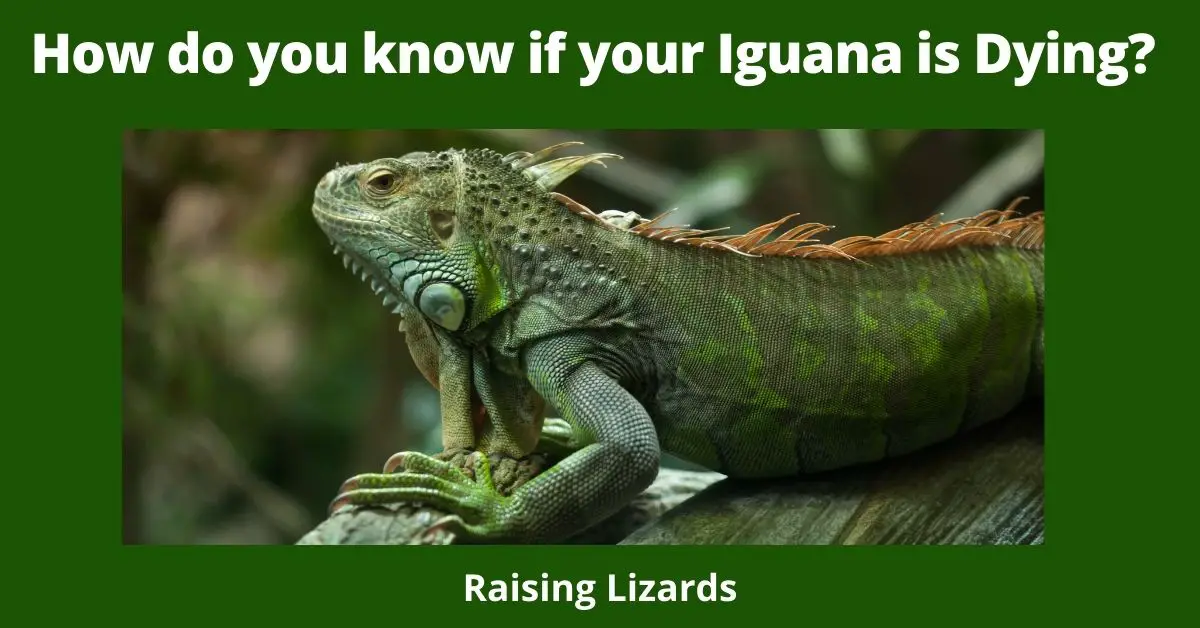
What Causes Iguanas to have Difficulty When Breathing?
If your Iguanas breathing is labored, wheezing, or gasping for air, it may be due to several factors:
- An obstruction in the airway such as a foreign body or an infection.
- A respiratory infection such as pneumonia.
- Heart failure.
- Cancer.
- Exposure to smoke or fumes.
- Low oxygen levels in the environment.
- Heat stress.
- Stress.
What Causes Iguanas to have Sunken Eyes?
One of the most common causes of sunken eyes in iguanas is dehydration. If your iguana isn’t getting enough water, his eyes will start to look sunken and dry. Be sure to provide your pet with plenty of fresh, clean water and check the humidity levels in his habitat to make sure they’re within the ideal range.
Another common cause of sunken eyes in iguanas is malnutrition. If your iguana isn’t getting enough protein or other essential nutrients, his eyes will start to look sunken and unhealthy. Make sure you’re providing your pet with a nutritious diet that meets all his needs.
In some cases, sunken eyes may be a sign of a more serious health issue. If you notice any other changes in your iguana’s appearance or behavior, it’s important to take him to the vet for a check-up. Sunken eyes can be a sign of dehydration, malnutrition, infection, or even cancer.
What Causes Iguanas to have Loss of Weight?
Weight loss in iguanas can be caused by a number of factors, including:
- Poor diet
- Infection
- Parasites
- Tumors
- Cancer
- Stress
If you notice your iguana losing weight, it is important to determine the cause and take corrective action. A poor diet, for example, can be corrected by adding more nutritious foods to your iguana’s diet. Infection can be treated with antibiotics, and parasites can be eliminated with medication or a deworming treatment. Tumors and cancer should be diagnosed and treated by a veterinarian. Stress may require changes in the environment or handling of the iguana.
What Causes Iguanas to have Scales Lifting?
If the Skin or scales seem to be lifting up that could indicate a few things. One is a health issue where the scales are trying to protect the iguana from an infection or injury. Another reason for lifting scales can be dehydration which will cause the skin to dry out and pull away from the body.
- Skin Problems that are common to Iguanas are:
- Scale Rot: This is a fungal infection that will cause the scales to become soft, lift and turn black.
- Mites: These are tiny parasites that can cause severe skin irritation. They can be seen as small black dots on the skin and look like dirt.
- Sunburn: Too much exposure to the sun can cause the skin to become dry, cracked and peel.
- Bacterial Infection: This can cause the scales to become red, swollen and pus may form.
What Causes Iguanas to Change In Body Color?
If Your Iguana is looking pale or yellow, there is a good chance that he or she is experiencing liver disease. This can be caused by a variety of things, including infection, parasites, toxins, and even diet.
Iguanas with liver disease will often lose their appetite and become lethargic. They may also vomit and have diarrhea. In severe cases, the iguana may even go into a coma.
If you think your iguana might have liver disease, take him or her to the veterinarian as soon as possible. The vet will be able to diagnose the problem and prescribe the appropriate treatment.
In most cases, liver disease can be cured if it is caught early enough. However, some iguanas may not survive even if they receive treatment. So it is important to be vigilant and keep an eye on your iguana’s health at all times.
The ill Iguana Symptoms That You Can Treat At Home?
Some of the Basics you can try like
- Change Diet
- Water by misting and eyedropper
- Proper Temps
- Proper Humidity
- Proper Lighting
- Supplements
- Call Vet for Antibiotics
- Take a stool sample to Vet
- Worm your Iguana
- Treat for Mites
- Check for Drafts
- Heat Lamp distances
What Causes Iguanas to have Metabolic Bone Disease (MBD)?
A very common problem for pet iguanas is a metabolic bone disease (MBD), which is a general term used to describe a number of diseases that affect the bones. The most common type of MBD is caused by a lack of vitamin D, calcium, or phosphorous in the diet.
Other causes of MBD can include:
- Inadequate exposure to UVB light
- Excessive exposure to heat
- Inadequate humidity
- Poor nutrition / Supplements
- Parasites
- Infection
- Tumors
If you think your iguana may have MBD, it is important to take him or her to the veterinarian as soon as possible for diagnosis and treatment. Left untreated, MBD can lead to permanent bone damage and even death.
If you are able to prevent MBD from occurring in the first place by ensuring your iguana has a healthy diet and plenty of exposure to UVB light, you will help keep your pet healthy and happy.
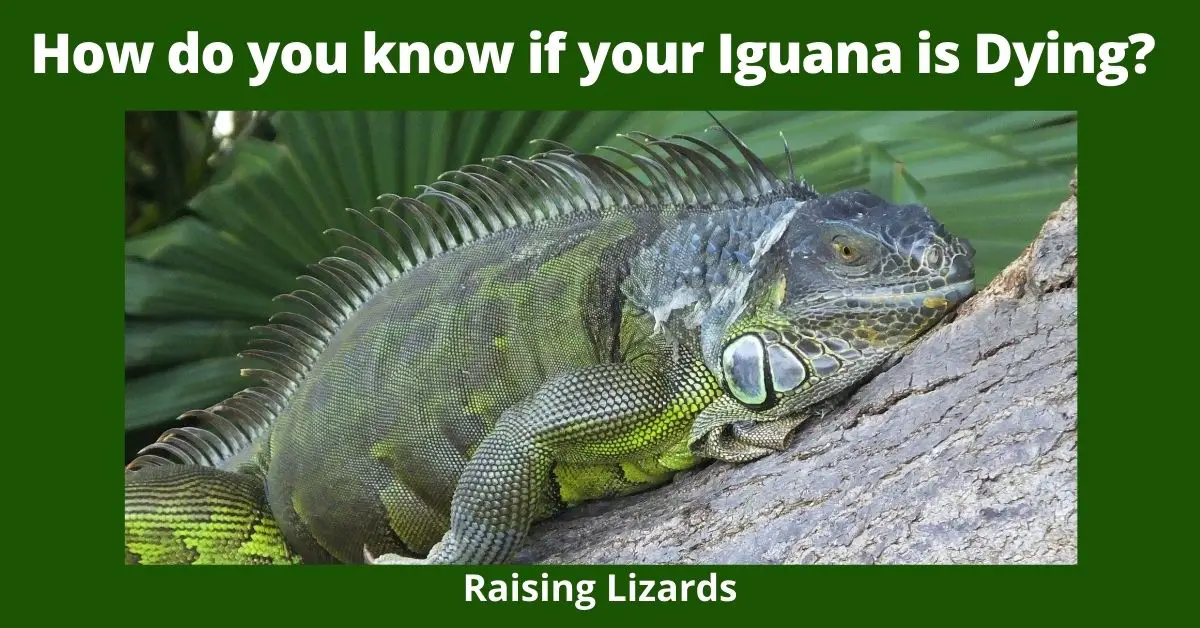
What Causes Iguanas to have Burns?
Iguanas can have burns from a variety of things.
One common cause is from when they are basking in the sun and their skin gets too hot.
This can happen if they’re out in the direct sunlight for too long, or if the lightbulb in their enclosure is too hot.
Treatment for burns includes keeping the area clean and dry, and applying a topical ointment if needed.
Iguanas can also get burns from electrical cords.
This is more common in young iguanas who are still exploring their surroundings.
What Causes Iguanas to have Bacterial Infection?
Infections in Iguanas can be caused by a variety of bacteria, including:
- Salmonella
- Pseudomonas
- Mycobacterium
These bacteria can cause serious health problems in Iguanas, including:
- Diarrhea
- Dehydration
- Lethargy
- Weight loss
What Causes Iguanas to have External Parasites?
Iguanas can pick up parasites from a variety of different sources, including other pets, wild animals, and even the environment. Some of the most common parasites that can affect iguanas include ticks, lice, mites, and fleas.
External parasites can cause a wide range of problems for iguanas, including skin irritation, hair loss, weight loss, and even death. If you suspect that your iguana has a parasite, it is important to take them to the veterinarian for diagnosis and treatment.
If you are concerned about parasites affecting your iguana, there are a few things you can do to help reduce the risk of infection. First, keep your iguana’s environment clean and free of debris. Second, make sure that your iguana is up-to-date on its vaccinations and deworming medications. Finally, inspect your iguana regularly for signs of parasites, and if you see anything suspicious, take them to the veterinarian right away.
It is fairly Common for Newly Purchased Iguanas to have parasites/worms
What Causes Iguanas to have Respiratory Disease?
Breathing problems in iguanas can be caused by a variety of things, including:
- Infections: Bacterial, viral, or fungal infections can cause respiratory problems in iguanas. Infections may be the result of an injury or from exposure to harmful substances.
- Allergies: Iguana allergies can cause respiratory problems when the animal breathes in the allergen.
- Smoke or fumes: Smoke or fumes from cigarettes, cigars, or other burning objects can irritate an iguana’s lungs and cause respiratory problems.
- Pollen: Pollen from plants can also cause respiratory problems in iguanas.
- Dust: Dust particles can also be a respiratory irritant for iguanas.
- Exposure to cold air: Iguanas that are exposed to cold air can develop respiratory problems.
- Excessive moisture: Excessive moisture in the environment, such as from high humidity or water leaks, can also cause respiratory problems in iguanas.
When do You Need A VET for your Iguana?
If your Iguana has any of the following symptoms, you should take it to a veterinarian as soon as possible:
- Sudden change in behavior, such as becoming lethargic or inactive
- Difficulty breathing or labored breathing
- Wheezing or rattling sound when breathing
- Coughing
- Discharge from the nose or eyes
- Open-mouth breathing
- Swollen tongue
- Reduced appetite or refusal to eat
- Unusual drooling
- Vomiting
- Diarrhea
- Weight loss
- Dehydration
If you have any other concerns about your iguana’s health, please take it to the veterinarian for a Professional Diagnosis
How To Help Prevent Sickness In Iguana?
What can I do to help prevent my iguana from getting sick?
There are a few things that you can do to help keep your iguana healthy and reduce the risk of illness. Some simple tips include:
- Making sure that your iguana has a healthy diet, with plenty of fresh vegetables and fruits.
- Providing a clean and comfortable living environment.
- Making sure that your iguana is properly vaccinated and has up-to-date health records.
- Regularly checking for signs of illness and seeking veterinary care if necessary.
following these simple tips can help keep your iguana healthy and reduce the risk of illness. If you have any questions or concerns, please consult you, local Reptile Vet
How to Tell if your Iguana is Stressed?
Some signs of stress in iguanas are:
- changes in behavior, such as hiding more or becoming more active
- changes in eating habits, such as refusing food or overeating
- changes in drinking habits, such as drinking more water or refusing to drink at all
- changes in toilet habits, such as pooping more or less often than usual
- changes in sleeping habits, such as sleeping more or less than usual
How to know if your Iguana is Healthy?
Some simply obvious signs that your Iguana is healthy so that it is alert, has a good appetite, bright eyes, and clear skin. Other things to look for include regular bowel movements, no discharge from the nose or mouth, and strong healthy limbs.
- Bright Colors – Iguanas that are healthy will often have bright colors. This is especially true for the green iguana, whose vibrant color can range from a light yellow-green to a deep forest green.
- Pink Gums – If your iguana’s gums are a healthy pink color, this is another good sign.
- No mucous – Iguanas that are healthy will not have any discharge from their nose or mouth.
- Regular bowel movements – Healthy iguanas typically have regular bowel movements. If yours has been having problems going to the bathroom, it might be a sign that something is wrong.
- Alert and Active – An iguana that is healthy will be alert and active, moving around its enclosure and exploring its surroundings.
- Good Appetite – A healthy iguana will have a good appetite, eating both fruits and vegetables.
- Bright Eyes – Iguanas with bright eyes are usually healthy.
- Clear Skin – Iguanas with clear skin are also generally healthy.
If you’re not sure whether your iguana is healthy or not, it’s always a good idea to take it to a veterinarian for a check-up. They can help diagnose any problems and give you advice on how to keep your iguana healthy.
How to Save a Dying Iguana?
Take it to a Reptile Veterinarian. Iguanas are exotic animals and as such, they can be difficult to care for properly. It is important that you know how to tell if your iguana is healthy so that you can provide the necessary care. If you suspect that your iguana is not doing well
How to tell if your Iguana is Dehydrated?
One of the easiest ways to tell if your iguana is dehydrated is by checking its urine. If it’s light yellow or clear, your iguana is hydrated. However, if it’s darker in color, like apple juice, then your iguana is most likely dehydrated. You can also check the skin on your iguana’s back. If it’s sunken in and doesn’t snap back when you push on it, your iguana is dehydrated. Finally, if your iguana isn’t eating or drinking, then it’s likely dehydrated as well.
Why is my Iguana is not Moving or Eating?
There are a few reasons why your iguana may not be moving or eating. One possibility is that your iguana is sick. If you think your iguana may be sick, take it to a veterinarian as soon as possible.
Another possibility is that your iguana is simply lazy. Iguanas often become inactive when the weather is hot, so try to increase your iguana’s activity level when the weather is cooler.
If you have ruled out both of these possibilities and your iguana still isn’t moving or eating, then it may be time to consider euthanasia. Iguanas can often become very ill and suffer for a long time, so if you feel like you can’t provide your iguana with the necessary care, it may be best to end its life. Euthanasia is a difficult decision, but it can sometimes be the kindest thing you can do for an animal.
If you are considering euthanizing your iguana, please talk to a veterinarian or animal expert first. They will be able to help you make the best decision for your iguana.
Final Thoughts – How do you know if your Iguana is Dying?
In Summary, this helps you get some info on Common Illnesses and treatments for Iguanas.

